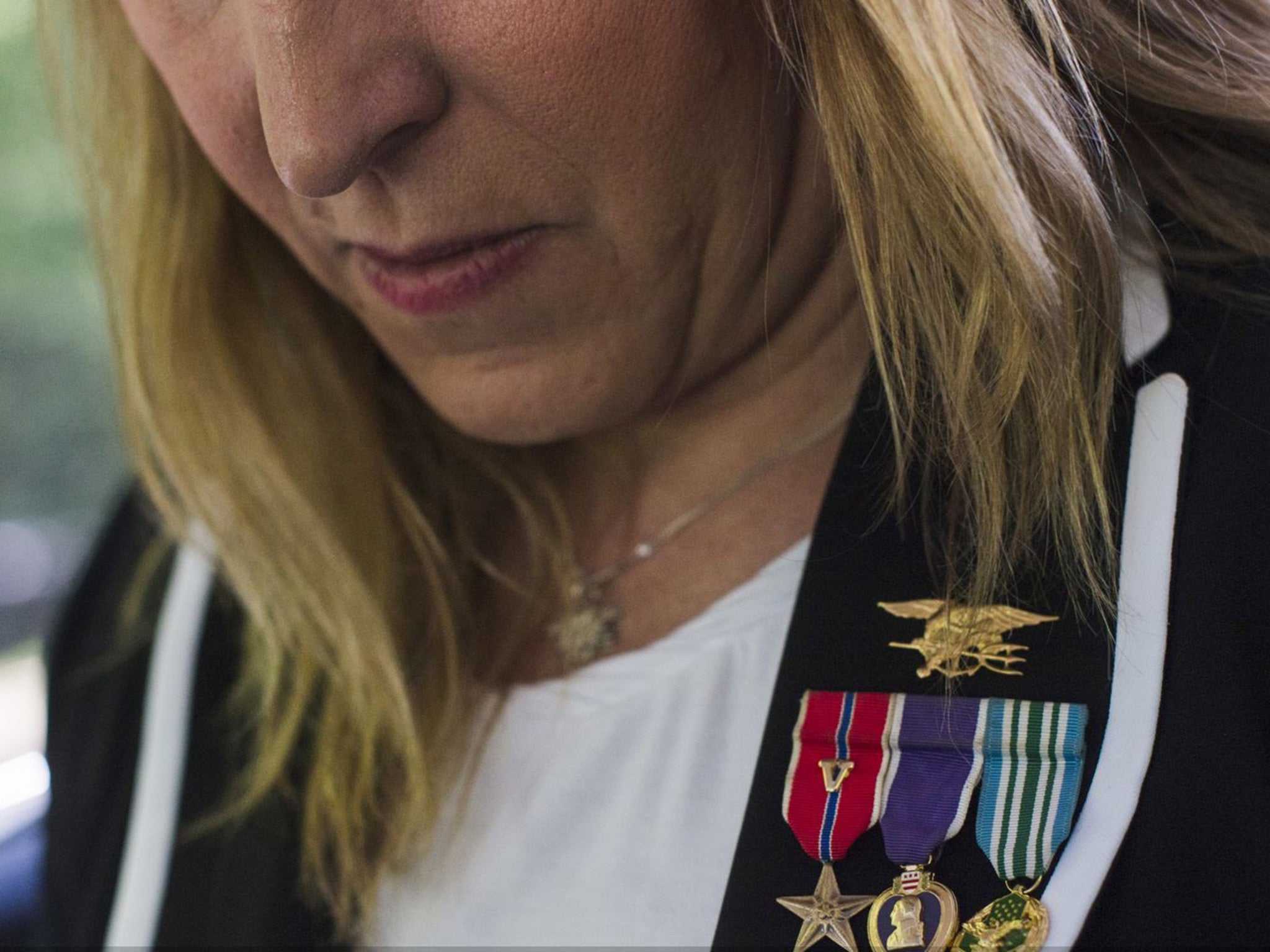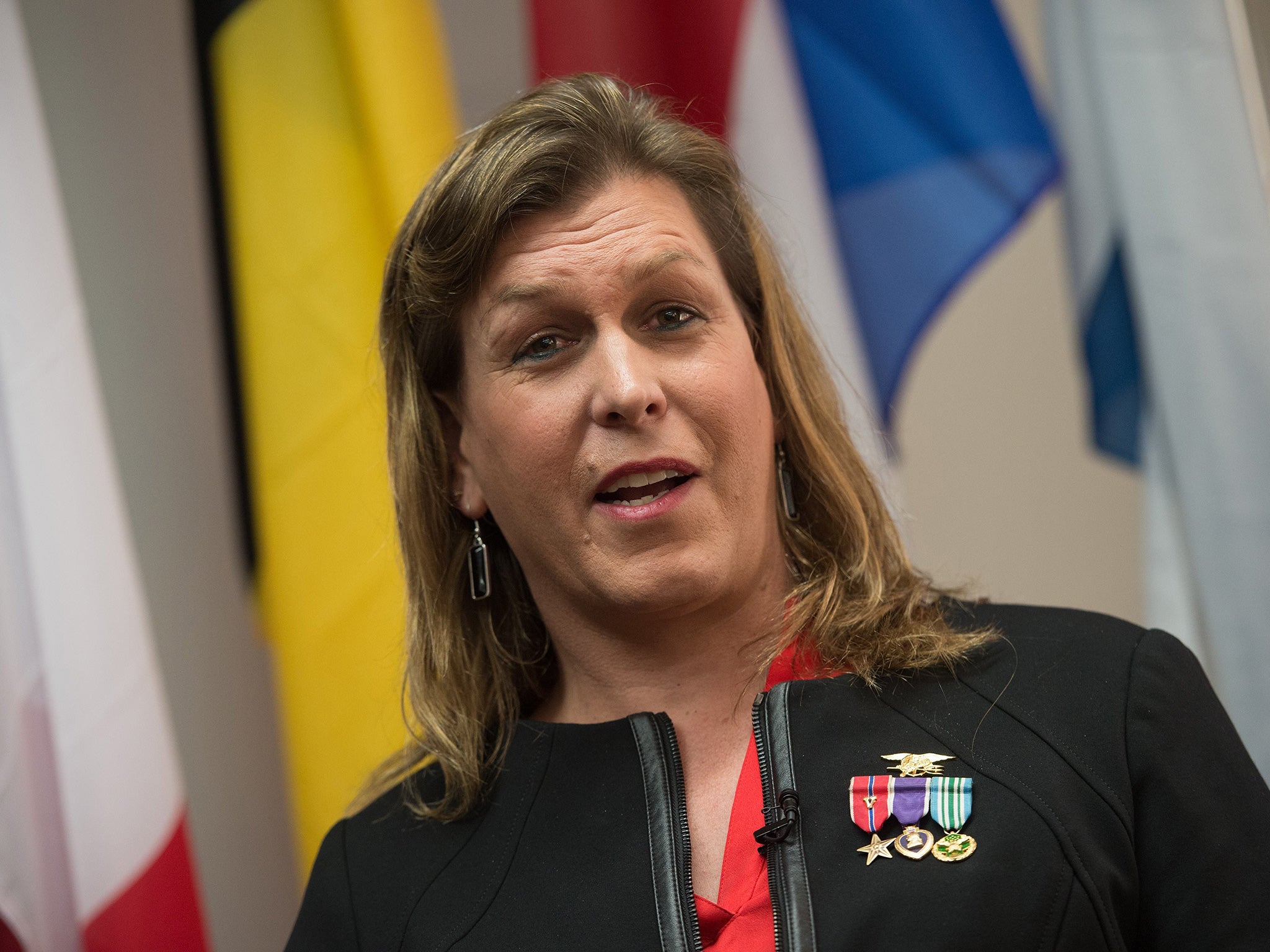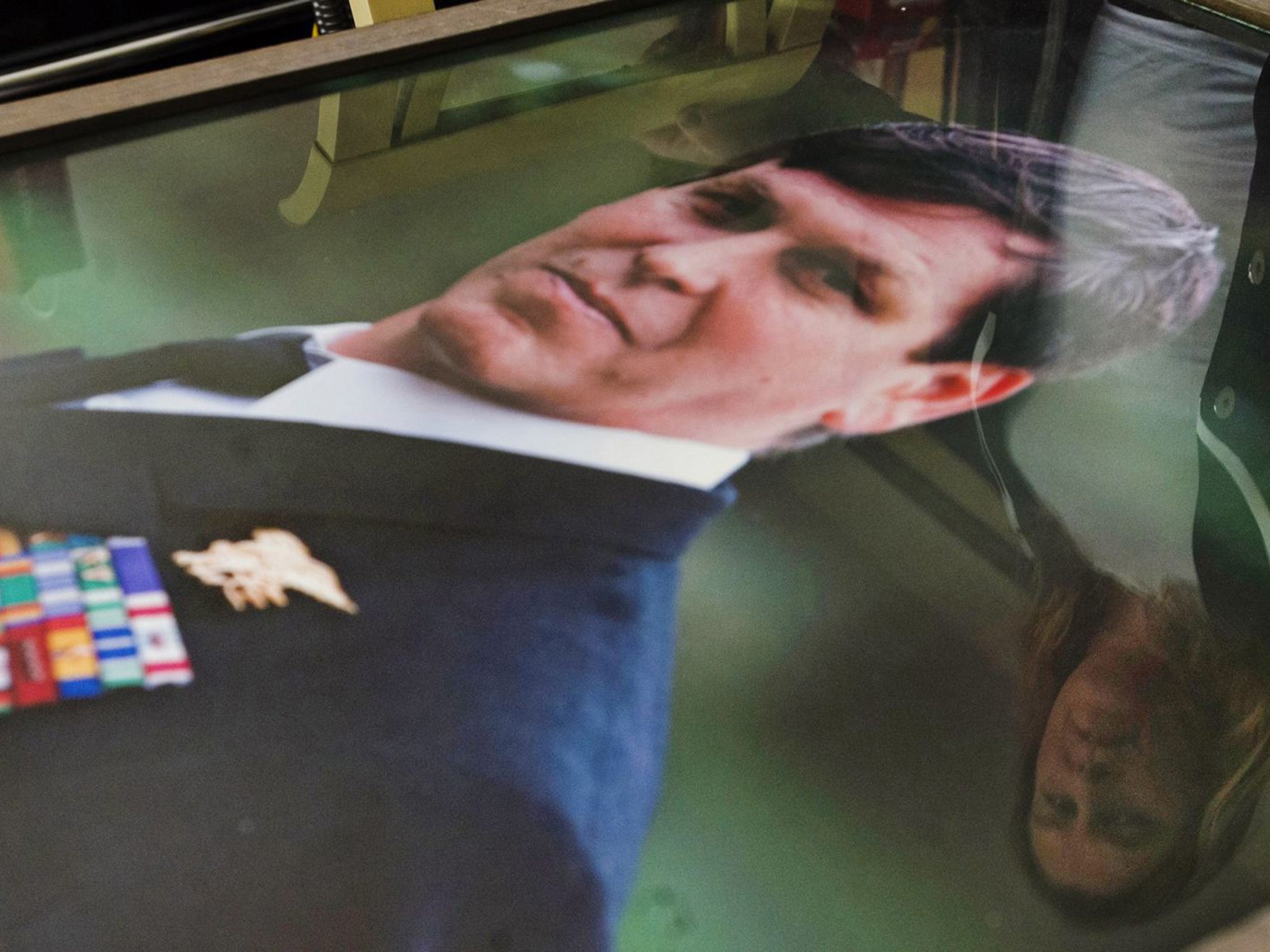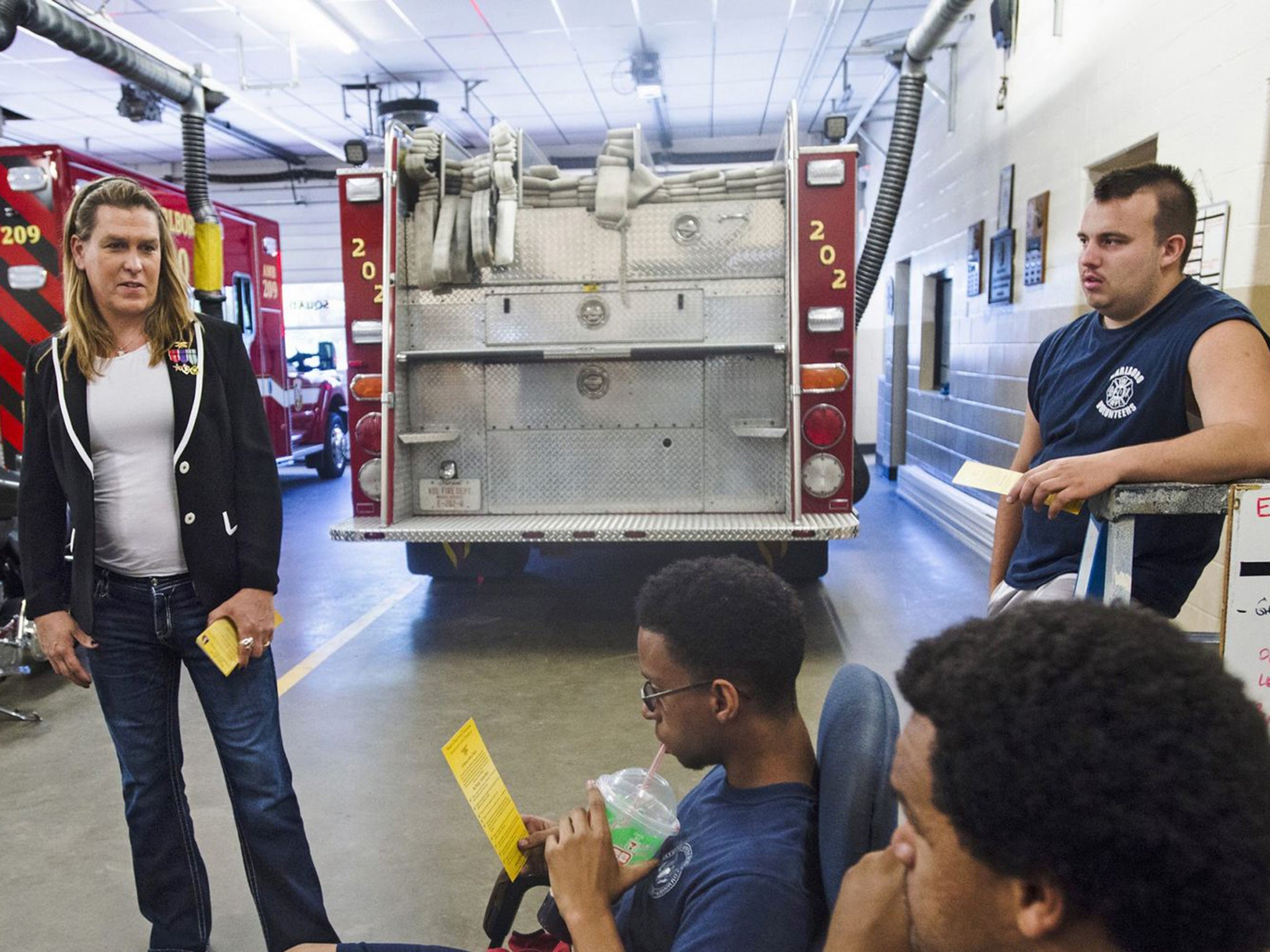Kristin Beck: The transgender former Navy SEAL running for the US Congress
Beck is seeking votes in a long-shot primary bid against Steny H. Hoyer

Your support helps us to tell the story
From reproductive rights to climate change to Big Tech, The Independent is on the ground when the story is developing. Whether it's investigating the financials of Elon Musk's pro-Trump PAC or producing our latest documentary, 'The A Word', which shines a light on the American women fighting for reproductive rights, we know how important it is to parse out the facts from the messaging.
At such a critical moment in US history, we need reporters on the ground. Your donation allows us to keep sending journalists to speak to both sides of the story.
The Independent is trusted by Americans across the entire political spectrum. And unlike many other quality news outlets, we choose not to lock Americans out of our reporting and analysis with paywalls. We believe quality journalism should be available to everyone, paid for by those who can afford it.
Your support makes all the difference.The first thing Lawrence Shaw noticed about the congressional candidate in his driveway were the medals — a Purple Heart, a Bronze Star with a “V” for valor, and a Joint Service Commendation decoration — clipped to her blazer.
“Are you retired military?” Shaw asked, taking a break from his lawn work to walk over to the broad-shouldered woman.
“Yeah, 20 years, Navy SEAL,” Kristin Beck said. She brushed back her long blond hair and showed him the silver pendant on her necklace, an eagle clutching a trident, anchor and pistol.
“Wow, I didn’t know there was a woman SEAL. That’s amazing,” said Shaw, a retired Army colonel.
“I’m the first one,” Beck said. What she didn’t say was that at the time of her service, she was Christopher Beck.
She didn’t think she needed to mention it. Two years ago, Beck publicly came out as a woman, but by her account she still “looks like a dude in a dress.” Even on a day when she was wearing jeans and a black jacket with white trim.
And anyway, she’s running for Congress — not so much as a transgender candidate as a candidate who happens to be transgender.

That’s why she didn’t bring up gender issues as she walked through Shaw’s upper-middle-class black neighborhood in Maryland, seeking votes in her long-shot primary bid against Steny H. Hoyer, the second-most-powerful Democrat in the House of Representatives. Beck, 48, almost certainly isn’t going to win. She doesn’t have much name recognition or money. She doesn’t even have the backing of the major gay and transgender advocacy groups. They have hesitations about her propensity to offend parts of the community and take issue with her attempt to oust Hoyer, a staunch ally for LGBT rights. But what Beck does have is an incredible life story, a slightly jumbled platform of about 70 issues, and a message that the district is ready for a change.
“This is good!” Lawrence Shaw’s wife, Yvette, said, leaning on a rake. “Another female in Congress — that’s what I’m talking about. Give it to the women!”
Lawrence and Yvette gamely posed for photos with Beck and promised to check out her campaign Web site. Their 15-year-old daughter, Lauryn, grabbed three “Beck for Congress” bumper stickers and pasted them onto the family cars.
Beck began that morning like she begins every morning: lying in bed trying to make the pain go away.
Years of wear and tear have destroyed the disks in her spine. Her knee aches from a hard parachute landing in Afghanistan. Her ribs still throb years after she fell off the roof of a hut, and her arm is still scarred from the time a rocket exploded beside her, a present from the Taliban on her 42nd birthday.

After adjusting and readjusting her back, she got out of bed and walked downstairs, clutching the railing for balance. She gulped down her pain pills and watched the fish swim through the 220- and 90-gallon tanks that she bought to remind her of the ocean.
Her house is a museum exhibit of her life. Twenty-nine medals from her years of service hang in a glass encasement by the window — an acknowledgment of hundreds of clandestine missions and dozens of captures and kills. Her abstract paintings of wild seascapes scatter the shelves with quotes scrawled on the back: “Even Heroes Rust and Break.” There’s a photograph in her kitchen from her SEAL days of a bushy-bearded Christopher. To blend in with the mujahideen, Christopher wore a wool Pashtun cap and a baggy brown vest. A disguise upon a disguise.
“I’ve been Conan [the Barbarian], and I’ve been Barbie,” she said, pointing to the photograph. “But both parts make up who I am.”
Christopher Beck was born in 1966 and grew up on a small farm in western Pennsylvania, attending a Christian school. By the time he was 5, Beck was sneaking into his sister’s room to try on her dresses. (Beck agreed with the use of male pronouns for describing her past identity.) Once, his father caught him wearing a pink tutu.

“He gave me a good enough scare that it would be a real long time before I ever did it again in front of anybody,” Beck recalled. Beck channeled his inner turmoil into sports, ran away from home for a brief period and ended up at the Virginia Military Institute after graduating from high school.
He joined the Navy SEALs, got married to his first wife, Shelly, and had two boys. He deployed 13 times, including a stint in Bosnia just two days after his wedding. He was reckless, running headfirst into battles, unsure of whether he wanted to live or die, knowing he wasn’t being true to who she was. Each time he returned stateside, he came home angry. He punched holes in the wall. He punched a drunk in a bar and spent the night in jail. He kept deploying to stay away, his marriage dissolving in the process. He served with the elite SEAL Team Six unit.
After 20 years fighting for her country, Beck decided to retire and fight for herself. She transitioned in 2013 to a wave of publicity. A former member of SEAL Team Six coming out as a woman made for good television. Anderson Cooper interviewed her in prime time on CNN, and the network later made a 90-minute documentary about her journey called “Lady Valor.” She covered up her biker-gang tattoo with a ladybug, quit her job as a military consultant and hit the road to make her living lecturing about human rights.
On tour, she talks about staring down Taliban warlords, kicking down doors to capture insurgents and sparing the life of an armed guard who would become a friend. She talks about coming home to a place that’s supposed to be safe and getting beat up outside of a bar for wearing a dress.
“I have a right to some happiness,” she said. She lobbied on behalf of a bill that would make it illegal to discriminate in hiring based on sexual orientation or gender, and she advocated for LGBT protections in the military.
It took time, but her parents learned to be supportive. It has been harder for her sons, whom she rarely sees anymore. Last year, Beck moved to Maryland’s 5th District near Andrews Air Force Base and her mother. At a Pentagon social event, Beck met a woman, Heather Stott, an active technical sergeant in the Air Force Security Forces. The two fell in love and got engaged.
Beck had always seen herself as a “sheepdog,” someone eager to protect the community. Now that she had a home that felt like home, she decided the best way to serve would be to run for Congress.
“I know I’m the underdog,” she said, while leaving the house for a full day of campaigning, “but I’m going to freakin’ win.”
Beck’s entrance into politics comes at a big moment for transgender issues. While there has been a surge in pop-culture acceptance (see: Caitlyn Jenner on the cover of Vanity Fair, Laverne Cox on the cover of Time, and the acclaimed TV series “Transparent”), civil rights for trans people lag behind. Beck would not be allowed to serve as openly transgender in the military.
Even while Beck says she won’t make LGBT issues a campaign priority, she has positioned herself as a de facto leader. (LGBT stands for lesbian, gay, bisexual and transgender.)
“When a community doesn’t have that many spokespeople, anyone who decides to put themselves out front automatically becomes a spokesperson, whether they want to or not,” said Dana Beyer, a transgender woman who has also run for office in Maryland. “It might not be fair, but it’s the truth.”
And not everyone is convinced that Beck is up for that particular role.
“She’s famous for speaking right off the cuff and having to backtrack,” said Autumn Sandeen, a transgender activist and Navy veteran. Many activists found Beck’s disparaging comments about Chelsea Manning (“If Bradley is truly ‘Chelsea’ then ‘she’ is a traitor to ME,” Beck wrote on Facebook) and Jenner (“He’s no hero,” Beck said in a TV appearance, raising an eyebrow about the reality star’s likely financial windfall) to be counterproductive.
Beck is a complicated personality. She makes a living giving speeches about her journey to self-acceptance but doesn’t want to be thought of as a “transgender candidate.” Sometimes, she’s okay with the term “trans”; other times, she asks to be referred to by the Native American term “two-spirited.” She suffers from post-traumatic stress disorder, manifested by sleep problems and a tendency to repeat herself. She gripes that Hillary Rodham Clinton may have lifted the term “everyday Americans” from her campaign. On a number of occasions, she asks not to be called a hero, even when no one has done so.
But as big as her personality is, Beck is trying hard not to make this an identity-based election. She has issued an extensive list of positions — equal pay for equal work, term limits for members of Congress, cleaning up the “huge amount of human fecal matter” in the Chesapeake Bay watershed.

“I try not to say much about the LGBT community,” she said. “It’s a crazy burden to ask someone to speak for a community.”
The only time her Web site broaches the issue is when she declares that “gay rights, marriage and a host of other issues should not be directed by a few old white guys in Washington D.C.” but left for the states to decide. This limited-government ideology doesn’t play well with most LGBT activists, who seek sweeping federal protections.
And have they mentioned that she’s trying to take out an incumbent who strongly supported same-sex marriage in 2012?
“I wouldn’t vote for a trans candidate just because she is trans,” said Sarah McBride, the first openly trans person to work in the White House. “And from what I know, there are policies that Kristin supports that give me pause. But anytime a transgender person is willing to tell their story and stand up and say, ‘This is my community,’ that’s beneficial.”
So this is how Beck’s pitch goes on the trail: She notes that she was a Navy SEAL, mentions how long Hoyer has been in office, calls him “some rich millionaire” who doesn’t understand the plight of working people. (In reality, Hoyer is one of the poorest members of the House, according to financial disclosures. Beck, though, says she made less than $40,000 last year on the speaking circuit.)
She does have a way of connecting with voters, adapting her spiel to specific audiences. At a Starbucks in College Park, a teacher listened attentively to her arguments for free college education, even while another pair of customers shooed her away without making eye contact.

She walked into a local fire station to chat up the crew and admired the Harley-Davidson parked inside, standing with her legs apart and chest out like an alpha male. “I don’t even remember the last time a politician showed up here,” said Deputy Chief Chris Hunter.
In a diner parking lot, she talked with David Jackson, a Vietnam vet, about the need for more veterans in Congress. “She has my vote,” Jackson said. “It don’t matter about your sex or gender.”
After the Shaws finished their yard work, the family headed inside to learn more about the intriguing candidate who had shown up in their driveway.
It took one Google search for Lawrence to realize something he had missed.
Lawrence is a religious man. His church isn’t open to LGBT issues. He went outside to take the Beck stickers off the cars — but Yvette insisted on keeping one on her gold Lexus.
For Yvette, this is personal. One of her daughters from a previous marriage, she said, is thinking about getting gender-reassignment surgery.
“I think people just need to be true to themselves,” she said a few days later. She rubbed her hand along the bumper sticker, smoothing it out.
“Kristin came here saying it was time for a change, and I think more people will be willing to listen to her nowadays,” she said. “I’m going to support her 100 percent.”
©The Washington Post
Join our commenting forum
Join thought-provoking conversations, follow other Independent readers and see their replies
Comments